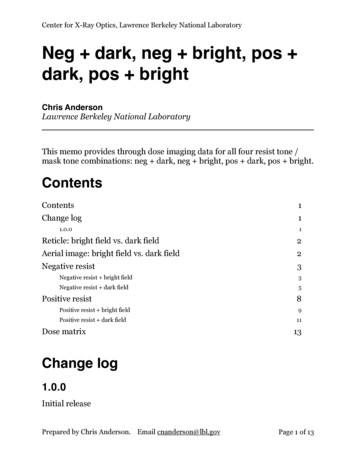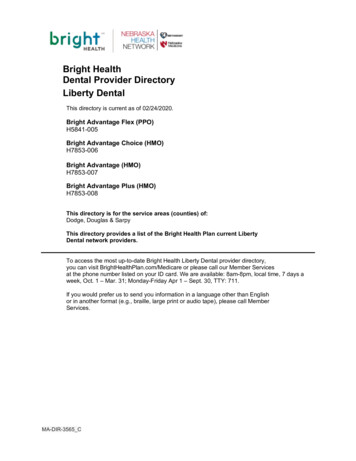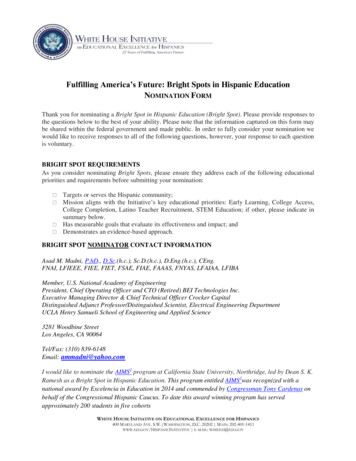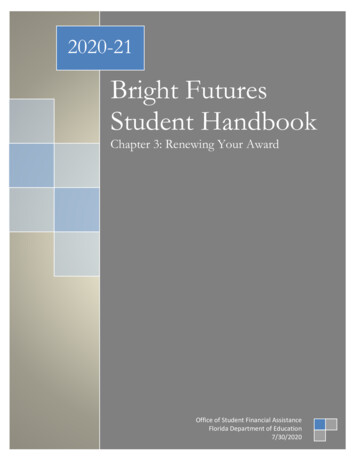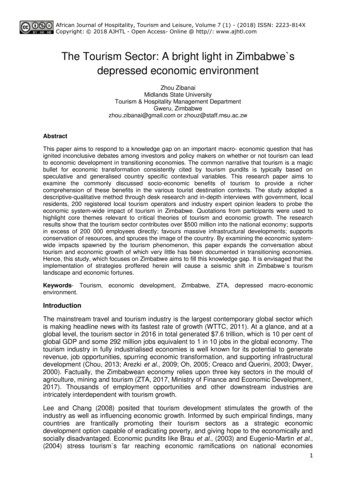
Transcription
African Journal of Hospitality, Tourism and Leisure, Volume 7 (1) - (2018) ISSN: 2223-814XCopyright: 2018 AJHTL - Open Access- Online @ http//: www.ajhtl.comThe Tourism Sector: A bright light in Zimbabwe sdepressed economic environmentZhou ZibanaiMidlands State UniversityTourism & Hospitality Management DepartmentGweru, Zimbabwezhou.zibanai@gmail.com or zhouz@staff.msu.ac.zwAbstractThis paper aims to respond to a knowledge gap on an important macro- economic question that hasignited inconclusive debates among investors and policy makers on whether or not tourism can leadto economic development in transitioning economies. The common narrative that tourism is a magicbullet for economic transformation consistently cited by tourism pundits is typically based onspeculative and generalised country specific contextual variables. This research paper aims toexamine the commonly discussed socio-economic benefits of tourism to provide a richercomprehension of these benefits in the various tourist destination contexts. The study adopted adescriptive-qualitative method through desk research and in-depth interviews with government, localresidents, 200 registered local tourism operators and industry expert opinion leaders to probe theeconomic system-wide impact of tourism in Zimbabwe. Quotations from participants were used tohighlight core themes relevant to critical theories of tourism and economic growth. The researchresults show that the tourism sector contributes over 500 million into the national economy; supportsin excess of 200 000 employees directly; favours massive infrastructural developments; supportsconservation of resources, and spruces the image of the country. By examining the economic systemwide impacts spawned by the tourism phenomenon, this paper expands the conversation abouttourism and economic growth of which very little has been documented in transitioning economies.Hence, this study, which focuses on Zimbabwe aims to fill this knowledge gap. It is envisaged that theimplementation of strategies proffered herein will cause a seismic shift in Zimbabwe s tourismlandscape and economic fortunes.Keywords- Tourism, economic development, Zimbabwe, ZTA, depressed macro-economicenvironment.IntroductionThe mainstream travel and tourism industry is the largest contemporary global sector whichis making headline news with its fastest rate of growth (WTTC, 2011). At a glance, and at aglobal level, the tourism sector in 2016 in total generated 7.6 trillion, which is 10 per cent ofglobal GDP and some 292 million jobs equivalent to 1 in 10 jobs in the global economy. Thetourism industry in fully industrialised economies is well known for its potential to generaterevenue, job opportunities, spurring economic transformation, and supporting infrastructuraldevelopment (Chou, 2013; Arezki et al., 2009; Oh, 2005; Creaco and Querini, 2003; Dwyer,2000). Factually, the Zimbabwean economy relies upon three key sectors in the mould ofagriculture, mining and tourism (ZTA, 2017, Ministry of Finance and Economic Development,2017). Thousands of employment opportunities and other downstream industries areintricately interdependent with tourism growth.Lee and Chang (2008) posited that tourism development stimulates the growth of theindustry as well as influencing economic growth. Informed by such empirical findings, manycountries are frantically promoting their tourism sectors as a strategic economicdevelopment option capable of eradicating poverty, and giving hope to the economically andsocially disadvantaged. Economic pundits like Brau et al., (2003) and Eugenio-Martin et al.,(2004) stress tourism s far reaching economic ramifications on national economies1
African Journal of Hospitality, Tourism and Leisure, Volume 7 (1) - (2018) ISSN: 2223-814XCopyright: 2018 AJHTL - Open Access- Online @ http//: www.ajhtl.commanifested through an increase in incomes, revenue in central government coffers throughmultiplier effects, support in balance of payments, and promotion of downstream industriesdirectly and indirectly linked to the tourism sector. Oh (2005) and Lim (1997) advocate forsustainable tourism development that contributes favourably to national economic growth.Therefore, a surgical analysis in the form of this kind of research is imperative for suchcountries that have set on the path of embracing tourism as part of their national economicdevelopment agendas.Zimbabwe is well resourced with a tapestry of tourism resources whose economic potentialhave not yet been realised. The country boasts of a hospitable people, and intact touristattraction centres with a relatively good global appeal, which is a sound base to develop arobust tourism industry that can drastically change the economic landscape and fortunes ofthe country in a short space of time. In government policy documents and official policyenunciations, the government of Zimbabwe conceded that tourism is the only sector that canquickly extricate the country from the current clutches of foreign currency shortages and highunemployment rates in the formal job market. The sector has been regarded as having lowhanging fruits that can provide a respite for the myriad of economic challenges currentlybedevilling the country. At this juncture, McKinnon (1964) s argument that the tourismphenomenon brings the much needed foreign currency that can be employed to importcapital goods, which can subsequently be used to produce goods and services, that in turnleads to economic growth is quite instructive. In contemporary Zimbabwe, the tourism sectorwas estimated to be worth half a billion in the year 2016, and is envisaged to contributesome 5 billion to the national coffers by the year 2020. Thumb sucking figures have beenthrown around relating to the economic contribution of this delicate sector to the nationaleconomy. Currently, Zimbabwe is ranked number 167 according to the tourismcompetiveness index, which is a tall order for Zimbabwe authorities to develop the industryto the desirable world rankings.With hindsight, Zimbabwe has always been riding on the back of the so called traditionalwestern markets which saw the steady growth of the sector since 1980 when the countryattained political independence from Britain. In the period 2017, tourism traffic inflows intoZimbabwe were slightly above 2 million (ZTA, 2017). Foreign currency receipts were arguedto have dipped to about 176 million. A further break down of tourist inflows showed thatwestern markets led in terms of generating tourism demand, the South Africa market is alsoon the rebound whilst there is a significant slump in the Asian market. On the foreigncurrency receipts the traditional markets remain by far the major markets, with high spendingpatterns albeit a comparatively low average period of stay.BackgroundTourism situation in Zimbabwe: Current dashboardA major highlight of tourism development recently has been the refurbishment of the VictoriaFalls airport facility. The Victoria Falls International Airport facility has been hailed as a vitalcog in the revitalisation of the country s tourism sector. The recent refurbishment of thefacility has breathed a new lease of life to the resort town and has gone a long way in givinga new face to Zimbabwe. The resort town of Victoria Falls is really the country s prime touristdestination, and rightly so the face of destination Zimbabwe. Tourism has thus been put onthe top of government s development priority list upon the realisation that it can play amagical role in the economic revival agenda of the country. The Ministry of Tourism andHospitality Industry (MoTHI) has come up with a development model which is unpacked asan ambitious target to increase tourist arrivals from the current level to 5 million tourists,which would yield or generate some gigantic 5 billion in foreign exchange by the year 2020.That is quite a feat given that the current national budget is only 4 billion, and also given2
African Journal of Hospitality, Tourism and Leisure, Volume 7 (1) - (2018) ISSN: 2223-814XCopyright: 2018 AJHTL - Open Access- Online @ http//: www.ajhtl.comthat the country is within a shouting distance to the year 2020. Another milestone worthmentioning in Zimbabwe s tourism terrain is the tourism master-plan that is being crafted bythe ministry. Essentially, this is the nucleus around which the tourism policy will beimplemented and is envisaged to give concrete direction regarding the tourism developmenttrajectory.The country is building up its tourism infrastructure despite years of economic downturn. Thesame resilience depicted by the tourism sector is on show in the country s conservationefforts currently underway, evidenced by a spirited clamp down on poaching and aflourishing biodiversity in the country s nature reserves. Zimbabwe is rich in traditions,history, art and cuisine but is still suffering from disinvestment, high poverty rates anddeterioration in the provision of amenities and other social services. Zimbabwe has anabundance of tourism resources that it can bank on to stimulate economic growth andalleviate poverty (ZTA, 2016).In an increasingly globalised world, the fierce competition among nations for foreign directinvestment (FDI) and tourist dollars has encouraged planners and policy makers toconcentrate their efforts on sharpening the advantages of their countries culture and tourismresources. Zimbabwe is undergoing rapid economic and political developments and is facedwith a dilemma to respond quickly to these changes, and to find resources in support of suchefforts. In recent years, the government adopted tourism development as a way to diversifythe economy.There are a number of plausible reasons as to why the government of Zimbabwe (GOZ)believes tourism development is an appropriate means of accelerating economic growth.These are, firstly, the observation that globally the tourism sector is growing exponentiallywith news bulletins from world tourism bodies like United Nations World Tourismorganisation (UNWTO), World Travel and Tourism Council (WTTC) optimistically indicatingthat by 2020, tourists will have hit the 1.6 billion mark making the sector a multi-trillion dollarindustry.Secondly, the tourism sector is growing at a much fastertelecommunications, and other sectors of the economy combined.ratethanfuels,Thirdly, mineral and agricultural prices are continuously fluctuating at the world market.Fourthly, Zimbabwe has historical ties with the west, and has cordial relations with the East.The East is increasingly becoming the future leader in terms of tourism demand at globalscale. Additionally, tourism has linkages to other sectors of the economy.Tourists consume goods and services that have direct linkages to farming, construction andother services (Sharpley, 2002). Tourism utilises free natural, cultural and heritage resourcesthat do not need extensive infrastructure support as noted by Sharpley (2002). Finally, thereare no trade barriers in tourism and there is general peace and tranquillity in Zimbabwe andit also has hospitable people.Sharpley (2002) posits that tourism s contribution to economic development has beenrecognised since the early 1940s, however it was only in the late 1960s when governmentsin the developed and developing world began to vigorously pursue tourism policies as ameans of achieving economic growth and diversification. The UNWTO forecasts that a totalof 2 trillion in global GDP and 305 million jobs will be generated by the tourism sector in2020. Today, tourism has become an integral element of economic development policy inmost countries, and tourism has become the world s largest industry. Harrilli (2004) confirms3
African Journal of Hospitality, Tourism and Leisure, Volume 7 (1) - (2018) ISSN: 2223-814XCopyright: 2018 AJHTL - Open Access- Online @ http//: www.ajhtl.comthat tourism has become an important component of economic development programmesaround the world.In recent years, Zimbabwe has experienced economic and social hardships due to a declinein economic activity in the country and recurrent droughts induced by climate change. Tomitigate the economic difficulties, the GOZ has adopted tourism as a new economicdevelopment strategy. This is buoyed by the fact that tourism is traditionally associated witheconomic, environmental and socio-cultural benefits which can contribute to the revitalisationof communities and enhancement of people s quality of life (Kuvan and Akan, 2005;Andereck and Vogt, 2000).Study rationale and theoretical contributionThe study was necessitated by an observation made by the Overseas Development Institutethat rigorous, empirical national and global level analysis of tourism s economic and povertyalleviation impacts is lacking, but none the less it is clear that the industry is havingsubstantial impact on local people and local economies in many developing countries. Thecurrent study will therefore contribute to the relationship between economic developmentand the tourism development process. Countries can be different in terms of the weight oftourism on their overall economies (Oh, 2005), the size and openness of the economy (Kimet al., 2006); and products capacity constraints (Dwyer et al., 2000), and the tourismeconomy relationship can also differ from one country to another, hence the current study.Several figures have been thrown around justifying investment in the tourism sector withoutempirical research in Zimbabwe, and the current study is one attempt to address this. Thecurrent study therefore seeks to expand on the single country study dimension in the contextof Zimbabwe s new economic order, underpinned by the new political dispensation. Will itchange the narrative? There has been renewed vigour in Zimbabwe to prioritise tourismdevelopment coupled with political will. Another observation from the tourism and economicdevelopment discourse is that findings from previous studies have largely been inconclusivewhile others have been mixed. This therefore calls for a further debate on the efficacy oftourism in relation to economic affluence. This is envisaged to deepen the comprehension ofcountry specific circumstances that may accelerate or impede the full realisation ofopportunities and benefits that come along or accrue with tourism development.Literature reviewThe tourism sector in Africa has witnessed the number of international tourist arrivalsincreasing by 8 per cent to reach 58 million in 2017 (WTTC, 2017). The 58 million touristscoming to mainland Africa represents some 5 per cent of the 1 billion global tourists.Therefore, there is huge potential for Africa to up its market share and compete againstmost advanced economies if the region is to meaningfully gain from tourism trade.Tourism has been credited as a peace builder and can be used to resolve conflicts wherethese exist. The globe is plagued by much political and social unrest. Countries cantherefore ride on tourism to maintain peace and tranquillity at global level which is vital foreconomic prosperity. Over the past several decades, the relationship between tourismspending and economic growth for both developing and developed countries has beenextensively researched (Chou, 2013). The WTTC (2011) weighed in to say that tourismwould continue to be one of the world s largest industries, in 2011, it contributed 9 per centof global GDP, a value of 6 trillion, and accounted for 255 million jobs. Over the next tenyears, the industry is expected to grow by an average of 4 per cent annually.Authoritative tourism global bodies and agencies are in agreement that growth in the traveland tourism industry outpaced that of the global economy and the outlook for the industry4
African Journal of Hospitality, Tourism and Leisure, Volume 7 (1) - (2018) ISSN: 2223-814XCopyright: 2018 AJHTL - Open Access- Online @ http//: www.ajhtl.comremain robust and bullish, and will continue to be at the forefront of wealth and employmentcreation in the global economy (Dwyer et al., 2004). This is despite the emergence of anumber of challenging headwinds like terrorism, global financial depression, diseaseoutbreaks, and political instability. In light of the preceding, it is crystal-clear that the traveland tourism sector is increasingly becoming more and more significant not only as an engineof economic development and but also as a vehicle for sharing cultures, creating peace andbuilding mutual understanding amongst nations (WTTC, 2017). The importance of thetourism sector as an economic activity in most countries around the world cannot thereforebe over-emphasised. Its direct economic impacts coupled with its induced impacts cannot beignored by policy makers and planners.It is not debatable that the tourism industry has emerged as one of the leading serviceindustry in the global economy in recent decades. Oh (2005) highlight that modern tourismhas become a key driver for socio-economic progress through the creation of jobs andenterprises, infrastructure development and the export revenue that is subsequently earned.The contribution on the world wide economic activity is estimated at some five per cent whileits contribution to employment is estimated in the order of seven per cent of the overallnumber of direct and indirect jobs world-wide.The importance of the tourism sector can be understood further basing on statistics from theWTTC. The insight given by the WTTC is that the industry s direct contribution to GDP in2010 was 1.770 billion, and it created 3 million direct jobs. Combing through the literature ofKim et al., (2006); Lee and Chang, (2008); and Kreishan, (2010) one would realise that thesubject of tourism and economic growth has been a trendy sphere of research. However,what is conspicuous in the literature discourse are two broad categories of studies, which onone hand are country-group narratives and on the other hand are single-country narratives.The works of Balaguer and Vantavella-Joral, (2002); and Durbarry, (2004) attest to this.Durbarry (2004) established that tourism is more relevant in small countries like Zimbabwethat relies upon subsistence agriculture, and extraction of minerals, where it can be a gamechanger.The role of tourism in sustainable developmentTourism for many countries is seen as a foremost instrument for regional development, as itarguably stimulates new economic activities. In terms of the theory of development, tourismfulfils three cardinal objectives namely economic, social, and ecological. Economicobjectives entail growth, efficiency, and equity; social objectives revolve around localpeople s empowerment, participation, social cohesion, cultural identity, and lastly, ecologicalobjectives relate to ecosystem integrity. The attaining of the above outlined objectivesguarantees sustainable development. Pearce (1991) classified the socio-economic effects oftourism on the national economy as balance of payment. For many nations tourism is oftenthe main source of foreign exchange earnings. On regional development tourism frequentlyspreads economic activities more across the internal borders of a particular country. On theaspect of diversification of the economy, tourism due to its multi-faceted nature may fosterthe build up of solid economic development. On income levels, tourism enables the countryto earn revenue due to tax collection and foreign currency receipts. There are a whole lot ofemployment opportunities an in most countries tourism has become an important source ofemployment especially for the unskilled and semi-skilled labour force. However, it has beenargued that the effects of tourism on the socio-economic front of the country vary from onecountry to another, and are a function of local tourism promotion and marketing strategies, awide set of circumstances and the tourism life cycle.Ashley et al., (2007) opined that tourism s current role in expanding economic opportunity indeveloping countries
The study was necessitated by an observation made by the Overseas Development Institute that rigorous, empirical national and global level analysis of tourism s economic and poverty African Journal of Hospitality, T
